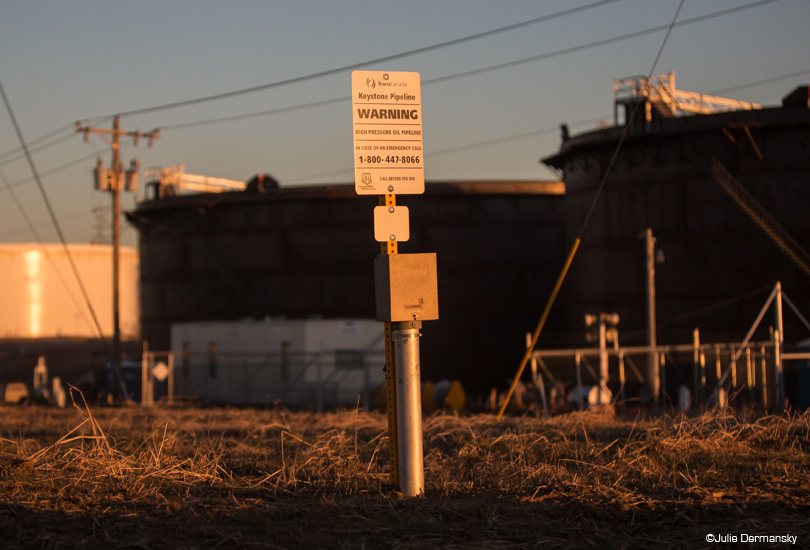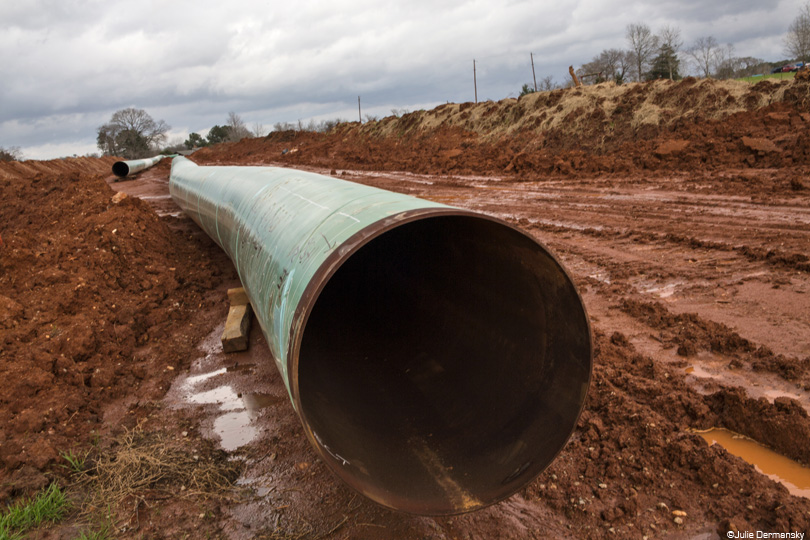Today a Nebraska commission handed TransCanada the final permit it needed to build its long-contested Keystone XL pipeline, a decision which did not consider the company’s previous safety violations. The decision to approve the international pipeline comes despite a major oil spill just a few days earlier from the company’s Keystone l line in South Dakota. Pipeline opponents vowed to appeal the approval, which was for a different, slightly longer and more expensive route through Nebraska than the one TransCanada preferred.
While not a complete victory for the company, Ken Winston, a lawyer representing environmental groups against the pipeline, explained that the alternative route presents the same kind of environmental problems as the preferred one. He pointed out that TransCanada brought up many problems with the alternative route, which he plans to mention in his appeal.
A few days into the presidency, Trump reversed President Obama’s Keystone XL decision, which originally denied TransCanada a permit to cross the U.S.-Canada border. At a White House ceremony Trump joked to company CEO Russ Girling that he would put in a word with the Nebraska governor to help get the last permit. However, the permit was issued by Nebraska’s Public Service Commission (PSC), not the governor.
The Keystone XL is the final segment of a larger Keystone pipeline network built by TransCanada. This portion will carry tar sands oil from Hardisty, Alberta, to Cushing, Oklahoma, where other pipelines will transport it to Gulf of Mexico refineries and ports.
Today’s Decision in Nebraska
This morning the Nebraska commission had to decide if the Keystone XL pipeline, which would pass through the state, serves the public interest or not. In final arguments submitted to the commission, some Nebraska landowners asserted that the pipeline “will not generate more tax revenues for Nebraska; it will reduce them” and that it would “only create eight or nine jobs in North Dakota.”
Like Trump, the commission ultimately green-lighted the project.
During the final permit hearing, the board heard a suggestion that TransCanada should use an alternative route that parallels the existing Keystone pipeline. This route would lessen a potential oil spill’s impact to the critical waters of the Ogallala Aquifer.
Earlier Decision and Spill in South Dakota
Last week’s 210,000 gallon spill of tar sands from the Keystone pipeline in South Dakota wasn’t supposed to factor into the Nebraska commission’s decision on the Keystone XL permit. By law, the board should not consider a pipeline company’s safety record when granting a permit. Any safety concerns tied to decisions on interstate oil transport are the domain of federal regulators.
Winston finds it absurd that the Nebraska commission approving the pipeline couldn’t consider TransCanada’s safety record. He maintains — and also plans to mention in his appeal — that when acting on behalf of the public’s interest, the commission ought to be able to consider the competence of the applicant.
Robin Martinez, a lawyer who represented the grassroots group Dakota Rural Action last year in a bid to stop a similar decision on the pipeline in South Dakota, would agree. “How can any regulator, in this case the Nebraska PSC, even begin to make an informed decision about [Keystone XL] without considering pipeline safety, the risk of leaks and spills, and the potential environmental effect of spills? They simply can’t,” he said.
“Those are core questions that need to be explored before any decision is possible,” he continued. “In my view, the Nebraska legislature pulled out all the stops to give TransCanada the prize by cutting off any ability on the part of the state’s citizens to mount a meaningful challenge to the permitting process. It’s frankly shameful for elected legislators to treat citizens that way.”
Martinez has appealed South Dakota’s decision to renew an expired Keystone XL permit in the state’s Supreme Court. A date has not yet been set for the hearing.
Last week’s spill in South Dakota was a reminder of the risks of oil pipelines. In the 15 minutes between TransCanada detecting a 2 percent drop in pipeline pressure and shutting down the pipeline, 210,000 gallons spilled on a South Dakota field near the town of Amherst, the company reports. TransCanada has not predicted how long it will take to the clean up the spill.
However, spills originating from small cracks in a pipeline are not picked up by spill detection equipment and can continue for a long time before being discovered. TransCanada’s detection system didn’t pick up a 2016 leak in the Keystone pipeline in South Dakota, allowing at least 168,000 gallons of dilbit (diluted tar sands) before a landowner noticed the problem. That spill did not impact the area’s water source.
Concerns Over TransCanada’s Safety Record
Canadian regulators noted 21 incidents in the Keystone I pipeline’s first year in operation. And U.S regulators identified up to 62 probable deficiencies in TransCanada’s operations of the pipeline, as noted in a letter they sent to the company in 2015.
The mounting failures of various TransCanada pipelines do not surprise Evan Vokes, former TransCanada materials engineer-turned-whistleblower.
Vokes warned regulators in Canada and the U.S. that when he worked there, the company often did not follow construction code. “Straying from the adopted code is not only illegal, but it compromises the integrity of a pipeline,” he said.
U.S. pipeline regulators’ final inspection report on the Keystone XL’s southern route showed that the company was still not operating in full compliance. But the Obama administration never commented on the possibility of denying TransCanada a permit due to its inability to follow the rules.
Instead Obama rejected the international border-crossing permit because it would undermine the country’s ability to combat climate change. “If we want to prevent the worst effects of climate change before it’s too late, the time to act is now, ” Obama said.
However, the current federal administration has shown more concern for the oil and gas industry’s bottom line than for climate change. Trump, and now the Nebraska commission, have helped TransCanada clear another hurdle to completing the Keystone pipeline network.
Nevertheless, the Canadian energy company still faces another challenge: the project’s financial viability. The demand for Canadian tar sands has declined since the Keystone XL pipeline project was first announced in 2008, casting doubt on the feasibility of building the pipeline.
Keystone XL pipeline’s southern route being installed on Michael Bishop’s land in Texas. Credit: Julie Dermansky
UPDATE: This story has been edited to better reflect the role of lawyer Robert Martinez.
Main image: Keystone pipeline marker in Cushing, Oklahoma. Credit: Julie Dermansky ©2015
Subscribe to our newsletter
Stay up to date with DeSmog news and alerts








